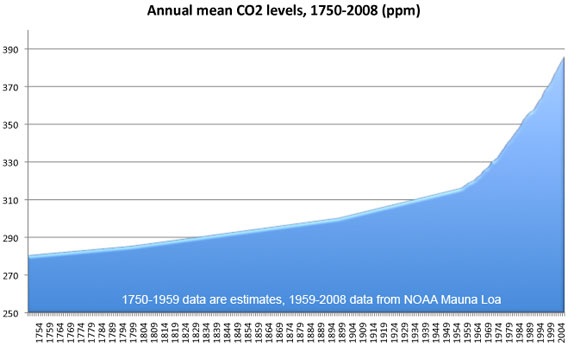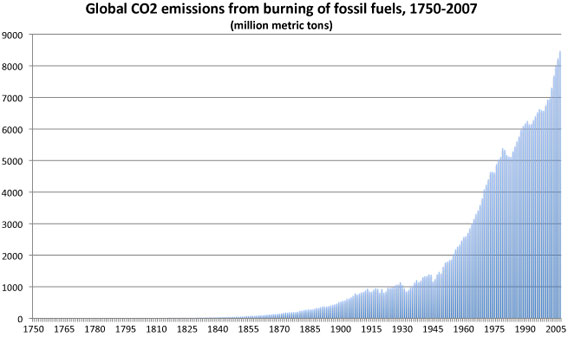In a statement issued today, more than 500 business leaders have called for “an ambitious, robust and equitable global deal” on climate change.
The Copenhagen Communiqué, developed by the Prince of Wales Corporate Leaders Group on Climate Change and endorsed by a wide range of organizations, was distributed to world leaders leaders attending the UN General Assembly meeting on climate change today in New York.
The document calls for emissions cuts that would limit global average temperature rise to less than 2 degrees Celsius compared to pre-industrial levels, or 50-85 percent reductions from current levels by 2050.

The Communiqué says that such efforts will sustain long-term economic growth.
“These are difficult and challenging times for the international business community and a poor outcome from the UN Climate Change Conference in Copenhagen will only make them more so, by creating uncertainty and undermining confidence,” the document states. “Economic development will not be sustained in the longer term unless the climate is stabilized.”
The full text of the Communiqué appears below and at The Copenhagen Communiqué on Climate Change.

Global CO2 emissions from fossil fuel use, 1750-2007
The Copenhagen Communiqué on Climate Change
This communiqué is being issued by the business leaders of over 500 global companies. It calls for an
ambitious, robust and equitable global deal on climate change that responds credibly to the scale and
urgency of the crises facing the world today.
Earlier this year, the world’s twenty largest economies (G20) came together and agreed an unprecedented,
coordinated response to the global economic downturn. At the London Summit, the leaders of the G20
pledged to do “whatever is necessary” to restore confidence and growth to the economic system.
World leaders now need to demonstrate the same level of coordination and resolve to address climate
change. Economic development will not be sustained in the longer term unless the climate is stabilised. It is
critical that we exit this recession in a way that lays the foundation for low-carbon growth and avoids locking
us into a high-carbon future.
These are difficult and challenging times for the international business community and a poor outcome from
the UN Climate Change Conference in Copenhagen will only make them more so, by creating uncertainty
and undermining confidence.
In contrast, if a sufficiently ambitious, effective and globally equitable deal can be agreed, it will create the
conditions for transformational change in our global economy and deliver the economic signals that
companies need if they are to invest billions of dollars in low carbon products, services, technologies and
infrastructure.
The basic shape of an agreement should be as follows:
- The agreement must establish a global emissions cap and long-term reduction pathway for all greenhouse
gas emissions and sources, for the period 2013 to 2050 (with interim targets). These targets will need to
be guided by science to ensure global greenhouse gas concentrations are stabilised below critical
thresholds. When stating this, we understand that there is an emerging consensus behind an objective of
limiting global average temperature rise to less than 2 degrees Celsius compared to pre-industrial levels
and that this will require global emissions to peak and begin to decline rapidly within the next decade.
Even this scenario will require a reduction of 50-85% by 2050, according to the Fourth Assessment Report
of the Intergovernmental Panel on Climate Change (IPCC), and the later the peak in emissions, the
greater and costlier the required reduction. There is nothing to be gained by delay. - Developed countries need to take on immediate and deep emission reduction commitments that are much
higher than the global average, and which are backed up with credible strategies to de-carbonise their
economies. The developed countries need to demonstrate that low-carbon growth is both achievable and
desirable. They must also support the institutions and frameworks that will provide the necessary financial
and technological assistance to developing countries. - Developing countries will need to play their part by drawing up their own emission reduction plans in line
with their common but differentiated responsibilities and capabilities. Advanced developing countries
should continue to develop low-carbon growth plans, building towards the adoption of appropriate and
economy-wide commitments by 2020. Action at the sector level will help accelerate the large-scale
deployment of clean technologies through robust funding solutions, technological transfer and capacity
building. The least developed economies need additional assistance including increased and adequate
financing, and expanded cooperation to help them adapt to and join the new low-carbon economy.
Key supporting elements of the agreement must include:
- Credible measurement, reporting and verification of emissions which are vital to measuring progress
against the objectives of an effective climate treaty.
- Measures to deliver a robust global greenhouse gas emissions market in order to provide the most
effective, efficient and equitable emission reductions. It would be comprised of a growing series of national
or regional “cap-and-trade” markets linked together, in which the “caps” are brought down in line with the
targets that have been adopted for emission reduction. - Additional policy measures, because a strong carbon price alone will not be enough to deliver the level
and nature of change required across each economy. Measures will be needed; to deliver a step-change
in energy efficiency, to promote the rapid development, demonstration and wide deployment of low-carbon
technologies and also to stimulate new markets for low-carbon goods and services. These measures will
include ambitious performance and efficiency standards, bold public procurement commitments, and the
development of incentives. Robust intellectual property protection as well as other enabling policies are
key. - A framework for developing countries to accelerate the large-scale deployment of clean technologies
through robust funding solutions, leading to the adoption of emission reduction commitments. The Clean
Development Mechanism (CDM) must be revised to ensure it facilitates financial support and technology
transfer to developing countries on the scale required. To do this, the CDM will need to move from a
project-based mechanism (supporting ad-hoc or one-off projects) to a wholesale mechanism that helps
deliver additional emission abatement and low carbon growth in a transparent, robust and credible way, in
line with internationally adopted sustainability criteria. - An adaptation framework and funding mechanism to assist the poorest countries and people who are
particularly vulnerable to the effects of climate change, while being the least responsible for the problem.
Adaptation funding needs to be additional, predictable, stable and adequate. Governments need to assess
their climate-related risk exposure and pool their analyses. - A mechanism to Reduce Emissions from Deforestation and Forest Degradation in Developing
Countries (REDD) which should ensure substantial, predictable, results-based, and long term financial
flows to developing countries that achieve measurable and verifiable reductions in emissions from
deforestation and forest degradation. An immediate interim emergency package is also needed to provide
substantial funding to tropical forest nations to help them halt deforestation in the short term and to
embark on alternative economic development paths before full implementation of a REDD mechanism
takes place. - A comprehensive global approach to emissions from international aviation and shipping, and a clear
strategy to commercialize carbon capture and storage, leading to widespread deployment.
The strength of an agreement will be judged on its ability to drive substantive action both inside and outside
the UN process, at national and international levels, but in line with the principles agreed in Copenhagen.
A strong, effective and equitable international climate framework will stimulate the domestic policy
interventions, bilateral and regional deals that are needed as a matter of urgency to deliver on intermediate
and long-term reduction targets and accelerate construction of the low-carbon economy. This will unlock the
potential of business to do what it does best: to invest profitably, to innovate, and make affordable low carbon
products and services to billions of consumers around the world. The more ambitious the framework,
the more business will deliver.
The problem of climate change is solvable – many of the technologies required are available today while
others can be developed if the right incentives are in place. The policies needed are relatively clear, and the
costs of transition are manageable, even in the current economic climate. The one thing we do not have is
time. Delay is not an option.